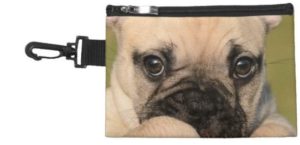Published: July 17, 2016 Updated: October 8, 2018
barkingroyalty.com
Even though the French bulldog is considered to be the healthiest bulldog, this breed may also have some health issues you, as its dog owner, should be aware of.
Every breed has genetic weaknesses that expose them to different diseases. That’s why every future dog owner should be informed about the breed they want to buy or adopt before doing it.
Even though the French bulldog is considered to be the healthiest bulldog (they have a lifespan of 10-12 years) , this breed may also have some health issues you, as its dog owner, should be aware of.
So… what could some possible health problems be?
First of all, you have to be aware that a bulldog is a brachycephalic dog and is characterized by something called:
The brachycephalic airway syndrome
If you own, or want to own, a bulldog you should be familiar with this word.
The word comes from Greek roots, “Brachy” meaning short and “cephalic” meaning head.
Considering that brachycephalic dogs have been bred in a way that they have a normal lower jaw, in proportion to their body, and a compressed upper jaw, these dogs have been compromised in many ways and it is important that you become familiar with the special needs of your bulldog.
This physical appearance affects:
The respiratory system
Fortunately, most dogs do not suffer from all aspects of this syndrome, but you should be aware of which one your pet may have.
Narrowed nostrils
Dogs with this type of physical appearance have very small nasal openings. If severe, it can be corrected surgically.
Tracheal stenosis
The windpipe of your bulldog can be narrowed in some places, which can lead to great anesthetic risks. It is why, before any surgical procedures, this should be examined by chest radiographs.
A dog with a more conventional face and throat is able to pass air quickly through panting. That is not the case with a brachycephalic dog.
This dog does so much more work to move around the same amount of air as a long-faced dog, so that the airway becomes inflamed and swollen, leading to a more severe obstruction, distress, and more over-heating.
Now… let’s take a closer look on:
Breathing issue
As a short-faced, dwarf breed, French bulldogs may have some breathing issues. The short face can make their breathing less efficient in comparison to some long-nosed breeds. As a result, these bulldogs have less tolerance of heat, exercise and stress, which leads to an increased need of breathing.
Therefore, you should keep your Frenchie cool during warm seasons and make sure that it always has access to fresh water. Exhausting exercise should also be avoided.
Don’t forget that French Bulldogs love company, in fact they hate being alone, and love kids!
What to do if your dog seems to overheat?
If you notice that your bulldog starts breathing heavily and even starts spitting up foam, you should definitely consult the vet and have its airway evaluated for pinched nostrils or an elongated soft palate. What is that?
Elongated soft palate
This is a frequent problem when it comes to French bulldogs. The soft palate is a flap of mucosal tissue which closes off the animal’s airway during swallowing and prevents food and liquids from going into their lungs.
However, it is difficult to fit the soft tissues of the mouth and throat into the short face of the bulldog.
As a result, the soft palate flats loosely down into the throat, which creates snorting sounds. A lot of barking or panting can lead to swelling in the throat and cause some real problems.
Effects of an elongated soft palate on the airway
Considering that the palate overlaps the epiglottis to a degree, it is partially obstructing the dog’s airway. Snorting, snoring, strider, gurgling and gagging are some of the signs indicating obstructions in the airway.
Naturally, the obstruction gets worse with exercise. With time, stretched ligaments lead to labored breathing and laryngeal collapse. This is a late stage in airway obstruction.
Can an elongated soft palate be treated?
Having in mind that this is a common health problem with French bulldogs, surgeries are common. The procedure consists of shortening the palate so that the edge opposes or slightly overlaps the epiglottis.
Results of this procedure are usually good and can prolong the life of your Frenchie by years, if the operation is done before some destructive changes in the larynx occur.
This is why it is important to check your dog often, and as soon as you see any signs mentioned above, by a veterinarian familiar with this breed.
Other possible consequences from an elongated soft palate
Even though the most common manifest is labored breathing, a relatively mild condition, there are some more severe conditions that can cause the dog to pass out from moderate exercise.
One of the possibilities is passive regurgitation, in which the affected dog vomits up food or phlegm after food or exercise.
Therefore, you should always ask breeders when buying your bulldog if either parent has elongated soft palate, or has been operated for the same reason, so that you are aware.
Another health issue and a dangerous consequence of the compacted airway of this breed could be:
Heath stroke
This is a life-threatening condition when the body temperature exceeds 41,5 degrees Celsius for more than a couple minutes.
All dogs, but French bulldogs especially, are easily overheated during hot weather because their only way of releasing excess body heat is through panting.
Naturally anxious, short-nosed dogs run a higher risk of heat stroke. Insufficient water to drink or a dog left in a car can also lead to heat stroke.
Initial signs of heat stroke
Deep, rapid breathing and sluggish mental status can be first signs of a heat stroke. This can be followed by loss of consciousness and convulsions.
Complications that may come from heat strokes include kidney and brain damage, as well as widespread clotting of the blood inside the blood vessels (condition called D.I.C.).
What to do if you suspect overheating?
The first thing to do is to lower the body temperature, rapidly until it is less than 41, 5 degrees, and then slowly. Saturate the fur with alcohol and cool water and put cold compresses to the head and the groin area.
If conscious, give your dog cool water to drink, but only in small amounts every few minutes. As soon as possible, go to a veterinary emergency facility, as early intravenous fluid therapy is crucial.
Breathing problems and temperature regulation are some of the most common issues when it comes to French bulldogs. But, what could some other health issues be?
Spinal diseases
Many bulldogs suffer from various back and spinal diseases, probably related to the fact that they were selectively chosen from the dwarf examples of the Bulldog breed.
Most common are premature degenerations of the intervertebral discs, like hemivertebrae. These are more commonly seen affecting the thoriac (chest) vertebrae and generally do not result in severe spinal cord deviation or narrowing, nor appear to be a cause of major problems later in life.
Excessively short bodied puppies tend to have more defects of the spine than the longer bodied puppy.
Back problems
Back problems are not uncommon for the older bulldog, after 6 years or so. This is usually a result of intervertebral disc problems, which can lead to incoordination or, in more severe cases, to a totally paralysed hindquarter.
This is probably a genetic problem. Fortunately, most dogs respond well to anti-inflammatory treatment and arthritis medication.
Von Willebrand’s Disease (VWD)
This is a bleeding syndrome French bulldogs can suffer from, similar to Haemophilia when it comes to humans. This syndrome can impede their clotting. In connection to VWD, French bulldogs can also suffer from thyroid condition.
Patellar luxation
The patella, or kneecap, is part of the knee. In patellar luxation, the kneecap pops out of place, in a medical or lateral position. Dogs can be affected by the time they are 8 weeks old.
Cherry eye
When the tear gland of the third eyelid pops out of position, it appears from behind the eyelid as a reddish mass. This condition is usually called ‘‘cherry eye’’. This can happen due to weakness in muscles or pressure from inflammation or infection.
What to do in case your dog suffers from a cherry eye?
The first thing you should do is to roll back the protrusion to its position, as soon as you notice it. This is often sufficient. Use a clean handkerchief and place over the protrusion.
Place your thumb on lower, inner edge of the eyelid and roll inward with minor pressure. Anti-inflammatory eye drops can help in maintaining the third eyelid, while the swelling reduces and heals.
What happens if the third eyelid is not retained?
If this is the case, surgery is necessary. There are a lot of effective procedures available, one of them being surgical replacement of the gland. The gland has a big role in maintaining normal tear production, and if removed it can lead to Dry Eye Syndrome.
Therefore, it is preferable to tuck the gland back inside the third eyelid.
So, as we can see, French bulldogs are mostly prone to respiration problems, but also spine and eye problems. Having these health problems in mind, it is also important to know how to treat your bulldog and what kind of anesthesia and medicine is acceptable.
Anesthesia
When going under Anesthesia, French bulldogs require special precautions.
There can be closing off of the trachea and soft palate when they are sedated, to extra caution must be taken. They can’t tolerate certain methods as some other breeds, due to their flat faces.
They need more monitoring and careful sedation procedures. For example, French bulldogs need to be tubed at all times. The tube should be removed when the dog wakes up, never before.
Choose a veterinarian with experience
Your vet should never give your bulldog Acepromazine or other sedatives that are known for lowering the blood pressure.
These are tranquilizers that depress the central nervous system and dogs can, in worst case scenarios, die from this medication.
Therefore, it is vital that you choose a veterinarian with experience when it comes to flat face breeds. Also, young puppies are more prone to have reactions to anesthesia, so they should only go under it in case of an emergency.
Medication
French bulldogs have small throat opening, so you should be careful when you give non-chewable pills. When you are giving oral medicine, as pills, plate it in some cream cheese or some other treat your dog likes.
He or she will gladly swallow the pill, without even noticing.
Inform yourself
Not all of these conditions are detectable in a growing puppy, and it is impossible to predict whether an animal will be free of these maladies, which is why you must find a reputable breeder who is committed to breeding the healthiest animals possible.
No matter where you buy your French bulldog, always ask what disorders they are testing for. This will save you time, money and energy – you will know what to expect and what to look out for!
Common sense advice
As with other breeds, regular checkups and routine vaccination are mandatory. Test your dog for intestinal parasites, heartworm prevention, and do the flea and tick control. Your vet should provide regular dental checkups and care, when needed. At home, clean your dog’s teeth regularly.
Conclusion
French Bulldogs rarely have heart problems, they are not high on the tumor list and their skin health is very good. However, even though they are considered to be the healthiest of the bulldog breed, they are still prone to some health problems you should know about.
Before buying, ask the breeder for previous health problems in the family, so that you can be prepared for whatever health issues you may come across!
Hope you found this article interesting. If so, feel free to spread the word!




